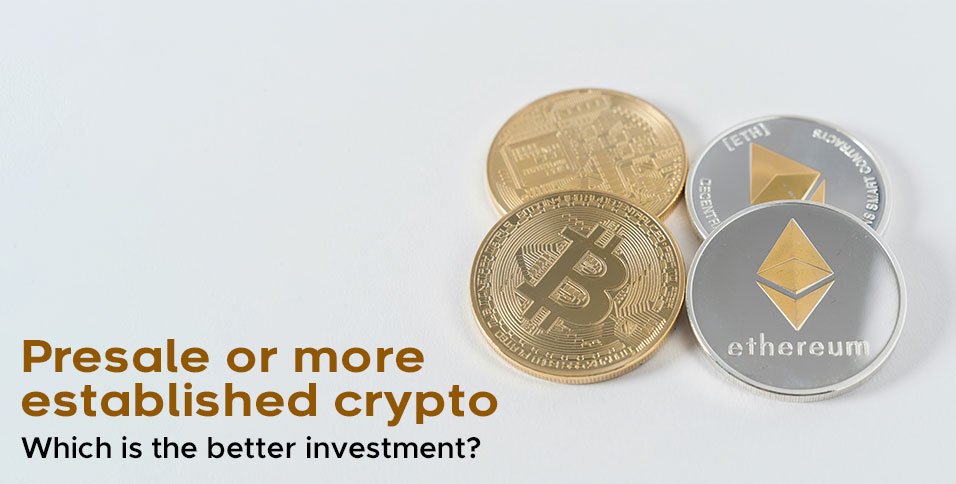In the crypto sector, investors often find themselves at a crossroads when deciding between investing in presale tokens or more established cryptocurrencies. Each option offers both opportunities and challenges, so research is needed to make informed investment decisions.
Here’s a quick look at the pros and cons of each type of investment:
Presale Tokens: The Potential for Early Rewards
Presale tokens, as the name suggests, are digital assets offered to investors before they become publicly available for trading on cryptocurrency exchanges. These tokens are typically sold during a fundraising phase known as crypto presales, which allows project developers to raise capital to support the development and launch of their blockchain-based platforms or decentralized applications (dApps).
One of the primary attractions of investing in presale tokens is the potential for early rewards. Since presale tokens are often offered at a discounted price compared to their anticipated market value post-launch, investors have the opportunity to acquire tokens at a lower cost, potentially realizing significant returns once the project gains traction and the token price appreciates.
Additionally, investing in presale tokens allows investors to participate in innovative blockchain projects and support the development of cutting-edge technologies. By getting in early on promising projects, investors can potentially capitalize on the growth of the cryptocurrency ecosystem and contribute to the advancement of decentralized finance (DeFi), non-fungible tokens (NFTs), and other emerging sectors within the industry.
However, investing in presale tokens carries inherent risks, including the possibility of project failure, token price volatility, and regulatory uncertainty. Since presale tokens are associated with early-stage projects that may lack a proven track record or established user base, there is a higher degree of risk involved compared to investing in more established cryptocurrencies.
Established Cryptocurrencies: Stability and Market Recognition
Established cryptocurrencies, on the other hand, are digital assets that have been in circulation for an extended period and have gained widespread adoption and market recognition. Examples include Bitcoin (BTC), Ethereum (ETH), and Ripple (XRP), which have established themselves as leading players in the cryptocurrency market.
Investing in established cryptocurrencies offers several benefits, including stability, liquidity, and market maturity. Unlike presale tokens, which may experience significant price fluctuations in the early stages of development, established cryptocurrencies have a track record of price stability and are less susceptible to sudden market movements.
Furthermore, investing in established cryptocurrencies provides investors with access to a diverse range of investment opportunities, including trading, staking, lending, and decentralized finance (DeFi) protocols. With a wide range of established cryptocurrencies to choose from, investors can tailor their investment strategies to suit their risk tolerance, financial objectives, and investment preferences.
Factors to Consider When Evaluating Investments
When evaluating whether to invest in presale tokens or more established cryptocurrencies, investors should consider several factors to make informed decisions:
- Project Viability: Assess the viability and potential of presale projects by evaluating the team, technology, market demand, and competition within the industry. In addition, consider if the project or coin solves a real-world problem or has a real-life use. Some coins can be used to buy goods, and services, wager at online casinos, and even fund travel. Look for coins that have real-life usability, as these coins typically do better in the long run.
- Risk Profile: Consider the risk-reward profile of presale tokens versus established cryptocurrencies and allocate funds accordingly based on investment objectives and risk tolerance.
- Market Conditions: Monitor market trends, investor sentiment, and regulatory developments to gauge the overall health and stability of the cryptocurrency market. When considering market sentiment, do a bit of research. Review social media pages and online forums and look for comments and questions posted by crypto enthusiasts within the community.
- Diversification: Diversify investment portfolios by allocating funds across a mix of presale tokens, established cryptocurrencies, and other asset classes to mitigate risk and optimize returns.
- Long-Term Outlook: Adopt a long-term investment horizon and focus on projects with strong fundamentals, sustainable growth potential, and a clear roadmap for future development.
Conclusion
Ultimately, whether presale tokens or established cryptocurrencies are the better investment depends on individual preferences, risk appetite, and investment objectives. By conducting thorough research, staying informed about market trends, and diversifying investment portfolios, investors can navigate the dynamic cryptocurrency landscape and make informed investment decisions that align with their financial goals. With careful consideration and strategic planning, investors can leverage the unique opportunities presented by both presale tokens and established cryptocurrencies to build a diversified and resilient cryptocurrency portfolio.
Whether seeking early-stage growth potential or stability and market recognition, there are investment options available to suit a wide range of investor preferences and objectives. By staying informed, exercising diligence, and adhering to sound investment principles, investors can position themselves for success in the fast-paced and dynamic world of cryptocurrency investing.
Also Read: Aussie Interest and Investment in Crypto: A Resilient Surge















